
-
Find the right food for your petTake this quiz to see which food may be the best for your furry friend.Find the right food for your petTake this quiz to see which food may be the best for your furry friend.Featured products
 Sensitive Stomach & Skin, assortiment de conserves
Sensitive Stomach & Skin, assortiment de conservesHill's Science Diet Sensitive Stomach & Skin Variety Pack
Shop Now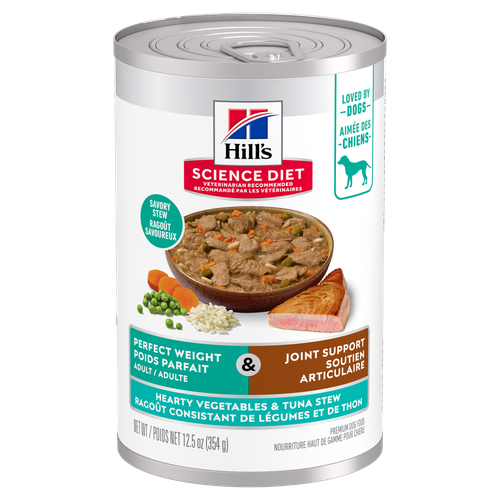 Adult Perfect Weight & Joint Support Hearty Vegetables and Tuna Stew Dog FoodShop Now
Adult Perfect Weight & Joint Support Hearty Vegetables and Tuna Stew Dog FoodShop Now Healthy Cuisine, Adulte, assortiment de conserves
Healthy Cuisine, Adulte, assortiment de conservesHill's Science Diet Healthy Cuisine Variety Pack
Shop NowFeatured products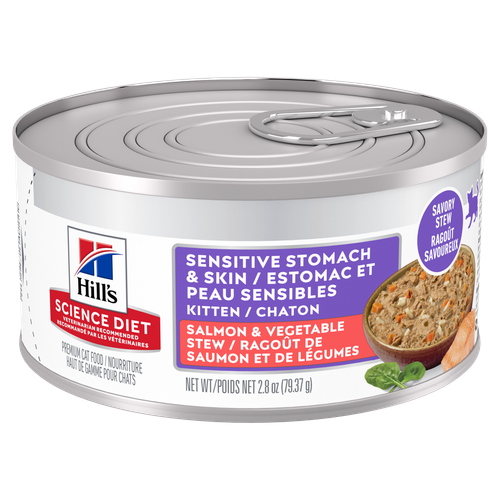 Kitten Sensitive Stomach & Skin Salmon & Vegetable Stew
Kitten Sensitive Stomach & Skin Salmon & Vegetable StewSupports kitten growth, digestive health, nourishes skin and promotes a lustrous fur
Shop Now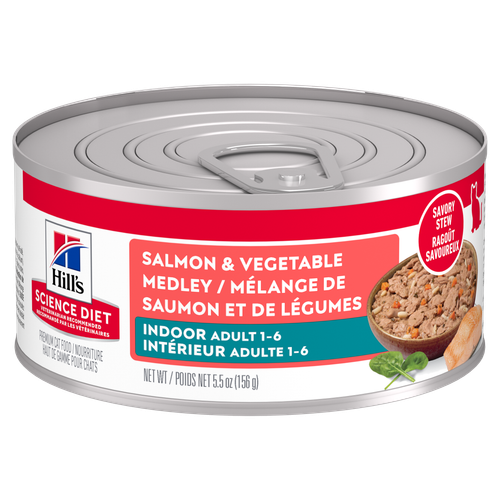 Adult Indoor Salmon & Vegetable Medley Cat Food
Adult Indoor Salmon & Vegetable Medley Cat FoodPrecisely balanced nutrition for indoor cats with the delicious taste of savory salmon and vegetables
Shop Now Adult Urinary Hairball Control Savory Chicken Entrée cat food
Adult Urinary Hairball Control Savory Chicken Entrée cat foodSupports the health of the whole urinary system with optimal levels of magnesium
Shop Now -
Dog
- Dog Tips & Articles
-
Health Category
- Weight
- Food & Environmental Sensitivities
- Urinary
- Digestive
- Joint
- Kidney
- Dental
- Cancer
-
Life Stage
- Puppy Nutrition
- Adult Nutrition
- Senior Nutrition
Cat- Cat Tips & Articles
-
Health Category
- Weight
- Skin & Food Sensitivities
- Urinary
- Digestive
- Kidney
- Dental
- Stress
- Cancer
-
Life Stage
- Kitten Nutrition
- Adult Nutrition
Featured articles Pet Food Storage Tips
Pet Food Storage TipsDiscover how and where to store your dry, as well as canned, dog and cat food. Learn how to find the "best before" dates on all Hill's pet food packaging.
Read More The Incredible Science Behind Your Pet's Microbiome
The Incredible Science Behind Your Pet's MicrobiomeLearn what a pet's microbiome is, how it contributes to your pet's gut & overall health, and why nutrition is important in maintaining healthy microbiomes.
Read More Compare Your Pet Food's Calories to Other Brands
Compare Your Pet Food's Calories to Other BrandsCompare Hill's Science Diet dog and cat food's calories against other pet food brands and AAFCO recommended maximum calorie count.
Read More -


If your dog has been extremely tired lately or has been having issues with their skin or hair, they could have hypothyroidism. Thankfully, thyroid problems in dogs are easy to diagnose and manage. While the exact cause of thyroid dysfunction in our canine companions isn't clear, we do know how hypothyroidism affects dogs and how to treat it.
What Is the Thyroid?
The thyroid, in dogs and in humans, is a butterfly-shaped gland located in the neck, right next to the windpipe. As part of the endocrine system, the thyroid gland makes the hormones necessary for cells to function normally. The thyroid affects the body's metabolism.
If a dog produces too much thyroid hormone, they can develop signs of hyperthyroidism, including diarrhea, increased heart rate, anxiety and hyperactivity. If the thyroid gland doesn't secrete enough thyroid hormone, you get the exact opposite — hypothyroidism, the most common thyroid problem in dogs.
Risk Factors for Hypothyroidism in Dogs
Hypothyroidism is most often diagnosed in dogs between 4 and 10 years old. In most cases, an autoimmune disorder that shrinks or inflames the thyroid tissue causes hypothyroidism in dogs. There are no known genetic causes. However, according to the American Kennel Club, medium to large breeds are at greater risk than toy and miniature breeds. The cocker spaniel, miniature schnauzer, dachshund, Doberman pinscher, golden retriever, Airedale terrier and Irish setter also appear more likely to develop the disease. While rare, dogs can also develop hypothyroidism due to cancer of the thyroid gland. Spayed and neutered dogs seem to have increased risk; however, the many benefits of spaying and neutering may outweigh this suspected risk.

Signs of Hypothyroidism in Dogs
Hypothyroidism in dogs affects every system of the body, including the gastrointestinal system, the nervous system and the circulatory system. If a dog hasn't been spayed or neutered, hypothyroidism can also affect the reproductive system.
The most common signs of low thyroid problems in dogs include:
- Excessive tiredness
- Mental dullness or depression
- Weight gain
- Skin infections
- Cold intolerance
- Skin and coat changes, such as hair loss, excessive shedding, excessive dandruff, a dry or dull coat and hyperpigmented skin.
- Excessively long heat cycles in female dogs who haven't been spayed
- Generalized weakness and other neuromuscular problems
- A stiff walk or loud breathing due to laryngeal paralysis (loss or normal function of the larynx)
How It's Diagnosed
The good news is that, unlike human thyroid problems, thyroid problems in dogs are usually easily diagnosed and managed. If you suspect your dog might be suffering from a thyroid problem, make an appointment with your pet's veterinarian. During the visit, the vet will ask you some questions, conduct an exam and will likely ask to run some lab tests — probably blood work and urine testing.
High blood cholesterol is a common indicator of hypothyroidism in dogs. Most clinics can also test for thyroid hormone levels in dogs with a simple blood test.
All this information together will build a picture for your vet so that they can determine whether or not your dog has hypothyroidism.


Tasty Tips
Treatment for Hypothyroidism in Dogs
If your dog is diagnosed with hypothyroidism, don't worry! Even though you can't cure hypothyroidism in dogs, it's usually easy and relatively inexpensive to manage with an oral thyroid supplement. The supplement mimics the effect of thyroid hormone on the body. If it's successful, your dog will regain their energy, lose weight, have a brighter attitude and stop shedding hair.
The key thing to remember when treating thyroid problems in dogs is the importance of balance. If your dog takes too much thyroid supplement, they can develop signs of an overactive thyroid, which is the opposite of what you want. If the vet prescribes your dog a thyroid supplement, it's important to follow all dosing instructions — don't change the dosage without talking to the vet.
After starting your dog on a thyroid supplement, the vet will likely ask you to return in a couple of weeks to get a follow-up blood test to make sure your dog's thyroid hormone levels are appropriate. Once their hormone levels are stabilized, the vet will probably want to check them once or twice a year.
Nutrition for Dogs With Hypothyroidism
Providing proper nutrition to a dog with hypothyroidism is an important part of supporting overall thyroid health. Dogs with hypothyroidism need to be supported by food that contains balanced levels of amino acids, iodine, probiotics for gut health, antioxidants and the right amount of calories that contribute to a healthy weight. Ask your vet for nutritional recommendations for your dog.
Low thyroid problems in dogs are common and can be easily managed. Even with a diagnosis of hypothyroidism, your dog can live a long, healthy and happy life.


Dr. Sarah Wooten graduated from UC Davis School of Veterinary Medicine in 2002. A member of the American Society of Veterinary Journalists, Dr. Wooten divides her professional time between small animal practice in Greeley, Colorado, public speaking on associate issues, leadership, and client communication, and writing. She enjoys camping with her family, skiing, SCUBA, and participating in triathlons.
Related products
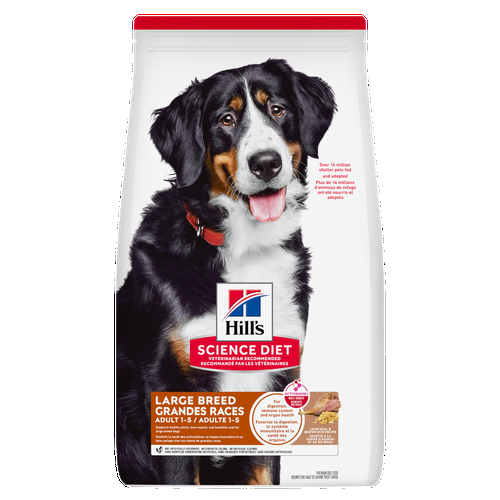
Supports healthy joints, immune system, digestion, lean muscle & beautiful coat
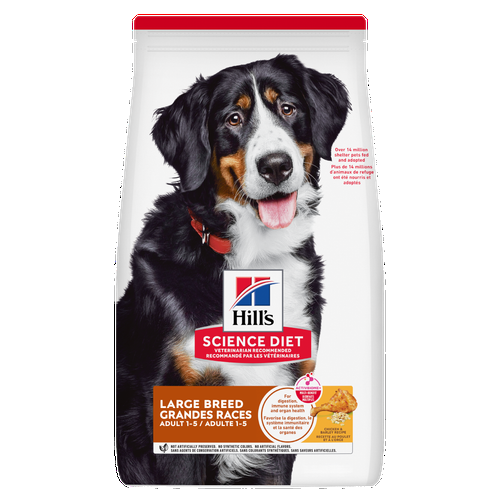
Supports healthy joints, immune system, digestion, lean muscle & beautiful coat
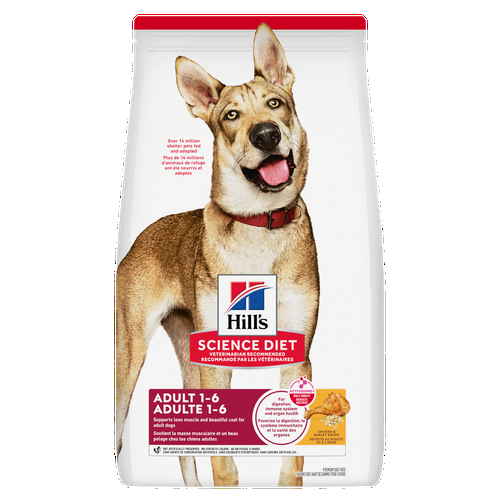
Supports healthy immune system, digestion, lean muscle & beautiful coat
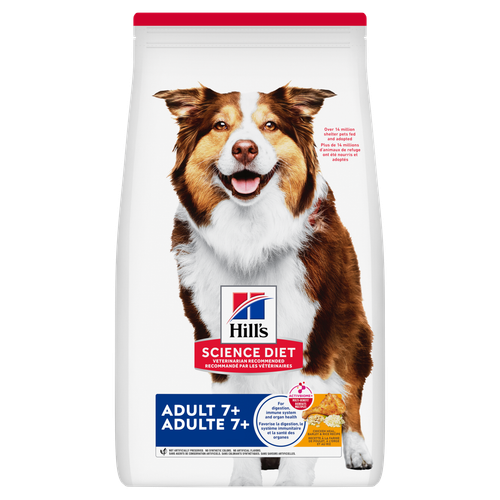
Supports energy level & beautiful coat. Helps keep immune system, heart & kidneys healthy
Related articles

Gather the following puppy supplies to prepare your family for all the fun (and commitment) that comes with being a dog parent.

Proper nutrition for your pregnant or nursing dog is vital to her and her puppy's health. Learn what you should do provide her with the proper nutrients.

Discover fun and engaging games and other ways to help your dog exercise, keeping him happy and healthy.

Learn how to stop your dog from begging at the dinner table, and understand how it can help contribute to his health.

Put your dog on a diet without them knowing
Our low calorie formula helps you control your dog's weight. It's packed with high-quality protein for building lean muscles, and made with purposeful ingredients for a flavorful, nutritious meal. Clinically proven antioxidants, Vitamin C+E, help promote a healthy immune system.
Put your dog on a diet without them knowing
Our low calorie formula helps you control your dog's weight. It's packed with high-quality protein for building lean muscles, and made with purposeful ingredients for a flavorful, nutritious meal. Clinically proven antioxidants, Vitamin C+E, help promote a healthy immune system.

